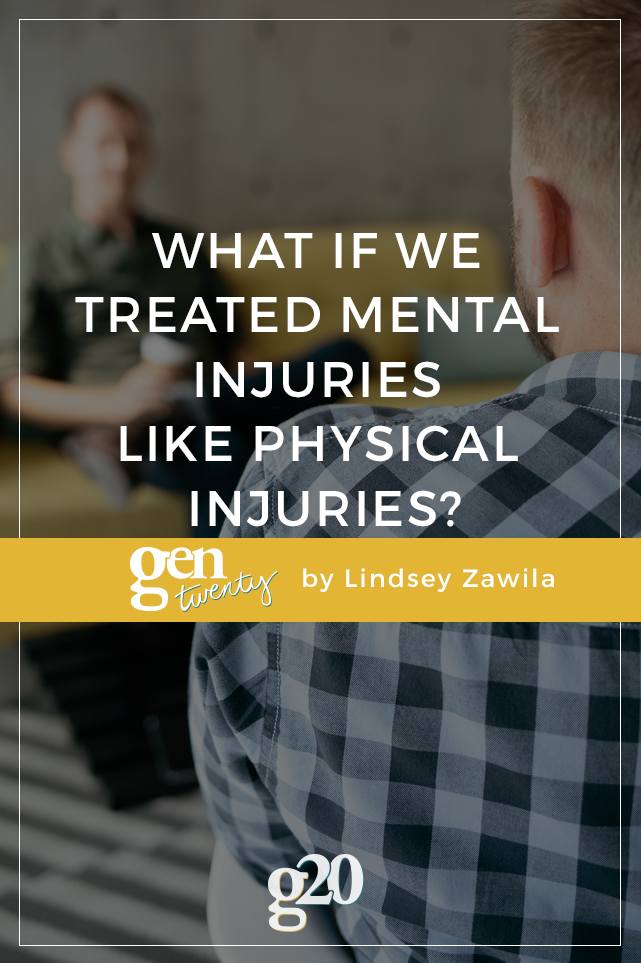
When a child gets hurt, we take care of them.
We comfort that child and give them a band-aid. We treat the wound and tell them that it’ll be all better soon. When they get sick, we give them medicine. If we take a child to the doctor, we hold their hand as they get a shot. Broken bones are wrapped up in casts and signed by friends. We send flowers and cards with well wishes to our loved ones in the hospital.
When athletes get hurt, we take care of them.
They are forced to take time off their sport, because competing with an injury will almost definitely lead to more severe injury. We ice and elevate injuries, wrapping them up and resting until they recover. Athletes stretch and warm up their bodies, preparing for the demanding tasks of their sport. They are expected to take care of their physical health.
Yet we don’t hold our mental health to this same standard.
People with depression are told to cheer up.
People with anxiety are told to relax.
People with post-traumatic stress are told to get over it.
When our minds suffer from bullying, abuse, and traumatic events, we are expected to simply move on.
There is no support, no medical checkups, and no recovery time.
We are expected to continue with life pretending to be perfectly fine.
We would never expect as much from someone with a physical injury.
For physical injuries, we know that continuous use of the body with an injury will most likely result in further injury.
We would never expect a runner with a broken ankle to continue as if nothing happened. We wouldn’t ask someone that just had a heart attack to return to work the next day. We accommodate people in wheelchairs with ramps and elevators. We send cards and flowers to people in the hospital, wishing them well and a speedy recovery.
Yet for mental health related ailments, we seem to just ignore it.
Because somehow, ignoring a mental health wound will make it go away.
[Tweet “We would never expect a runner with a broken ankle to continue as if nothing happened. “]
If we treated mental health injuries like physical ones, we’d actually rest and address the injury.
We’d realize the inconvenience it is on our everyday lives, and we’d support each other. We’d take time to recover, and go to the doctor if it was serious. We’d get treatment. We’d send our love and support to those suffering, wishing them well and a speedy recovery.
And then we might actually recover effectively.
Mental health wounds aren’t injuries that we can see or completely understand. We can see a broken leg, a sprained ankle, and open wounds. Internally, we understand organs and heart attacks and brain damage, even if we can’t see it. There are standard procedures for addressing open wounds and heart attacks, and an estimated recovery time.
The mind is so much more complex.
It varies person to person. There is no standard procedure for overcoming depression or trauma, though there are new techniques that help, there is no one-size-fits-all solution. Mental health injuries, like trauma, also vary immensely from person to person, making it difficult to admit and address. We cannot see these mental demons and struggles, and there is no estimated recovery time. It depends on the individual and that individual’s mind.
But the uniqueness of the mind is also what makes each of us amazing.
We are all different. Our personalities, perspectives, and attitudes vary person to person. We are all complex individuals that are uniquely amazing and incredible, and our individual minds play a huge role. It is our complex minds make us incredibly human.
Likewise, our internal demons are just as complex.
Maybe it’s impossible for us to understand one another’s internal demons because they are each as individual to us as we are to the world.
That doesn’t mean that they don’t exist, and pretending that they aren’t there won’t make them go away.
Because our minds can be as incredible as our mental demons are terrifying. We all have uniquely special minds, which has a shadow of a uniquely menacing demon. We will never completely understand another person’s demons just like we will never completely understand another person’s mind.
But it doesn’t mean we can’t recover.
It doesn’t mean we should ignore them.
It doesn’t mean we can’t extend kindness to one another.
And we definitely don’t have to face our demons alone.
If we treated our mental health like physical health, we would take care of our minds the way we take care of our bodies.
We would practice mindfulness and self-care, and we would let our minds rest when exhausted.We wouldn’t force ourselves to continue with our lives like nothing is wrong.
We would take care of our minds after being hurt, and we would let it recover.
We would give ourselves the benefit of the doubt, and we wouldn’t blame each other for mental health injuries.
We would simply support each other.
And maybe we’d actually recover.
[Tweet “What If We Treated Mental Injuries Like Physical Injuries?”]
